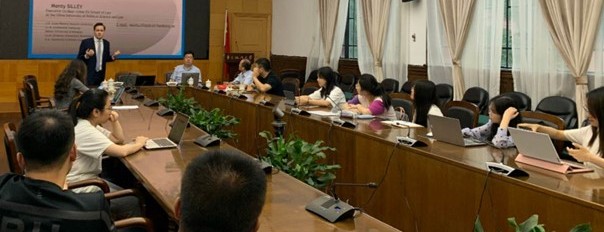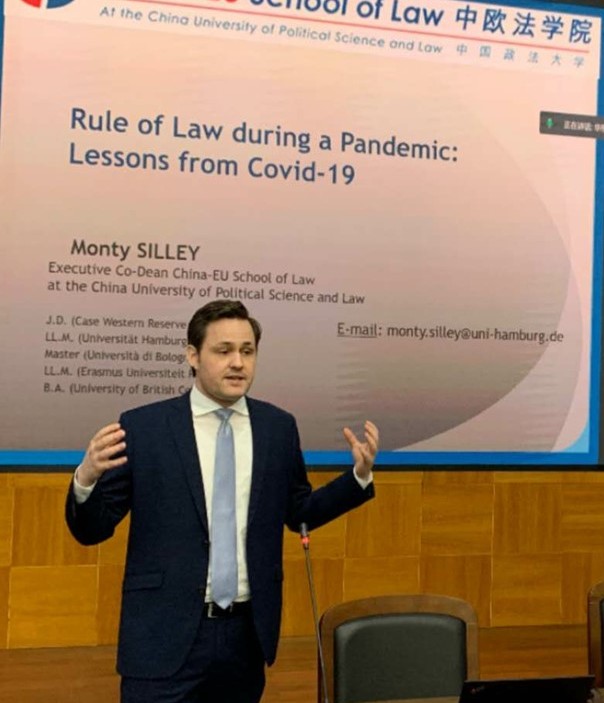The Public Health Governance Research Center of the East China University of Political Science and Law (ECUPL) held its sixth Public Health Forum on the Rule of Law on June 8, 2021. The guest speaker was Monty Silley, Executive Co-Dean at the China-EU School of Law at the China University of Political Science and Law in Beijing.

He gave a live speech on the ECUPL campus in Shanghai that was simultaneously broadcast online. The theme of his lecture was “Rule of Law during a Pandemic: Lessons from Covid-19”. The host of this event was Professor Man Hongjie, Director of the Public Health Governance Research Center of ECUPL.

He was joined by a panel of academic experts who provided additional questions and commentary. They were Professor Zhang Lihong, Deputy Director and Researcher Dong Chunhua, Deputy Director and Associate Professor Sun Weiyua, and Associate Professor Li Heng of ECUPL.

Dean Silley's lecture was divided into various parts. He first pointed out the political disagreements of requiring the wearing of facemasks in various jurisdictions around the world, especially at the start of the pandemic. He showed how this in part stemmed from the dissemination of misinformation about the benefits of wearing masks and possibly a desire to keep a limited supply of masks available for essential healthcare workers. However, some of these policies were misguided, as the mask shortages were resolved but the disease significantly spread when some people continually refused to wear masks. He provided some alternative legal tools that could have been better utilised, including purchase limits and the prevention of individual hoarding, public expropriation during the emergency situation, and government support or mandates to produce necessary supplies.

Regarding the personal choice of refusing to wear a mask, Dean Silley found there was a good legal basis for enforcing the wearing of masks during these times, especially in shops and on public transportation. Whereas most countries require people to wear seatbelts in cars or helmets on motorbikes, those laws are primarily enacted to protect the wearer. On the other hand, the wearing of a mask during the spread of a deadly disease, not only protects the wearer but also provides even higher protection to bystanders. Therefore, those who refuse to wear a mask during these times are not only putting themselves at risk of infection, but are increasing the risk to others, and greatly detracting from the society-wide prevention and control efforts.

Next, Dean Silley addressed a more controversial issue, of lock-downs and quarantines. He began by addressing the negative social and economic issues that can result from harsher government measures, including concerns for the survival of small businesses, employment, and mental health issues when people are asked to isolate themselves. However, if there is strict containment at an early stage, the spread of the virus can be controlled and indeed eradicated. China is one example of this. Yet partial closures only work partially and when things reopen a new wave of infections inevitably emerges. Here a short term pain is necessary to bring about a long term gain, in terms of both public health and providing a full economic recovery. We see that some countries, such as China, have been determined to eliminate the virus, while most Western countries sought merely to manage the rates of infection so their healthcare systems would not become overwhelmed. These were fundamentally different policy objectives that lead to very different legal rules and outcomes.
In terms of human rights issues, Dean Silley examined cases that had been brought at the European Court of Human Rights (ECHR), which now has over 20 Covid-related cases pending and probably numerous more to come, as they are exhausted in their national courts. The first such case, decided last month, was brought by a Romanian MEP who argued that he was put under an illegal administrative detention, tantamount to a house arrest, which violated his human rights. The ECHR, however, unanimously rejected this argument and found that there had been no such violation. “The extent of the restriction on the applicant’s freedom of movement is not to be defined as a deprivation of liberty on the basis of a general official closure” the Court decided.
This naturally led Dean Silley to a general discussion on derogations when it comes to the protection of human rights. While he began by acknowledging the importance of recognized human rights, he also explained that not all rights were absolute. Instead, such rights may be limited for just cause. This is reflected in Art. 15 of the European Convention on Human Rights and Art. 4(1) of the ICCPR, among other sources of international law. Dean Silley argued that during a public health crisis, different rights may come into conflict with each other, and more fundamental rights, such as the right to life, to health, and to access healthcare, should be predominant and overriding over other rights to free movement, assembly, and so forth. For example, Art. 11 of the European Social Charter imposes the positive obligation on States to take appropriate measures to prevent, as far as possible, epidemic diseases and other causes of ill-health. To evaluate the appropriateness of restricting some rights in favour of others, the standard should be one of adhering to the principle of proportionality. Therefore, derogations are justified, if they are limited in time and scope, to achieve the protection of the population from a deadly disease.
Dean Silley went on to talk about an even more controversial topic next, that of vaccines and the potential for legally requiring vaccinations. Here the ECHR recently issued an opinion regarding the mandatory vaccination of Czech pre-school children (unrelated to Covid). Again, the Court found no violation of human rights in this case. They recognised the social value in reaching herd immunity by having higher vaccination rates. The ECHR also showed particular concern for vulnerable members of the population, that for legitimate health reasons may be not be eligible to be vaccinated. These individuals, who are often at heightened risk in case of catching the virus as well, are particularly dependant on others getting vaccinated and the disease not widely spreading. This may allow more States to impose certain vaccination requirements in the future. However, Dean Silley pointed out that this is ultimately as much a political question as a legal one.
In the engaging question and answer period that followed, Dean Silley addressed numerous other topics, including liability for any potential injuries caused by vaccinations, the development of future vaccines by pharmaceutical companies, data protection when it comes to tracing infections and privacy with Covid-related APPs, vaccination passports for future travel, force majeure in the performance of contracts, Covid-related discriminations, and so forth.
Dean Silley ended by saying that the virus has no nationality and it is indiscriminate in terms of what nationality it attacks. Here we must engage in a joint fight, as humanity against the virus. As different legal systems have taken different approaches to dealing with this pandemic, we can now observe what has worked well and what has not. It will be important to learn from these experiences, and from each other, so we can manage not only Covid, but be also be better prepared for the next virus, that will inevitably come, and may be even more infectious or more lethal than Covid-19.

